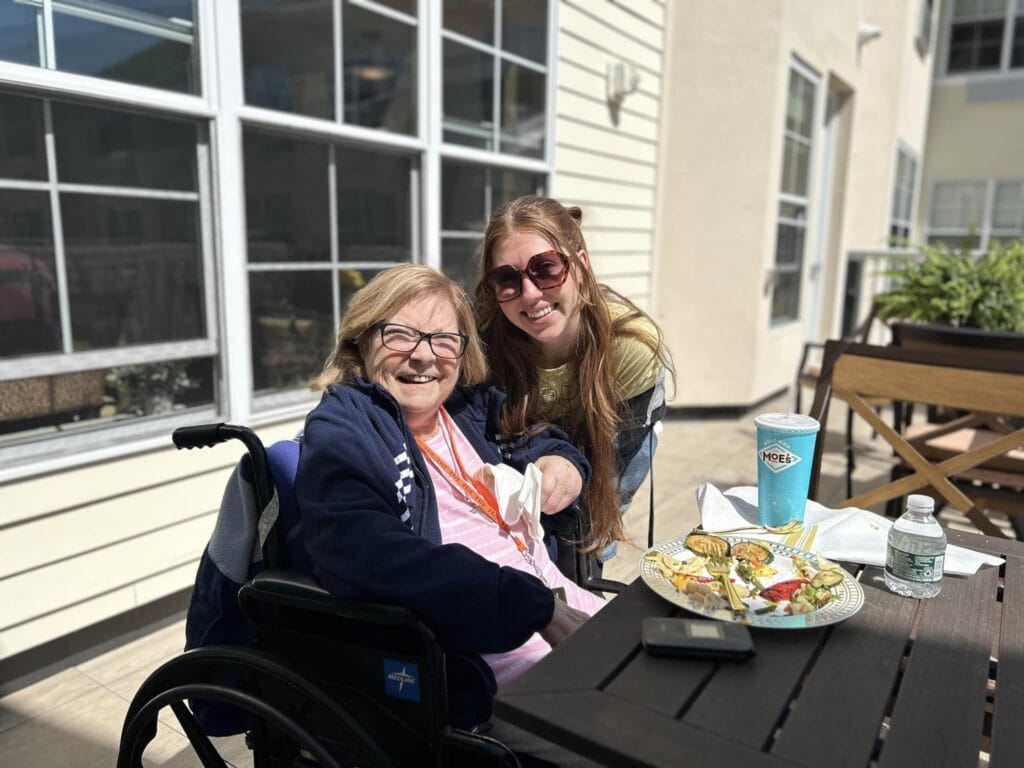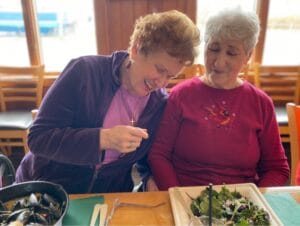Stage 6 dementia (and dementia as a whole) can be scary to talk about. The uncertainty of knowing whether you or a loved one forgot or misplaced something — or are experiencing the first signs of mild cognitive impairment (MCI; more on this later) — is scary.
But dementia doesn’t have to be scary. Dementia is a cluster of symptoms that stem from a handful of causes.
With the right medical expertise, professional advice, and resources, you and your loved one can live a life of joy, meaning, and purpose.
And that’s where we come in. With decades of experience working with individuals with dementia and Alzheimer’s, the senior living experts at Village Green provide loved ones and their families with quality solutions and dementia support.
Though dementia may impact most aspects of life, life can still be joyful and meaningful — both before and after a dementia diagnosis.
Families and seniors: if you’re wondering about the prognosis of dementia — as well as how to live your best life through it — look no further. In this article, we’ll discuss the seven stages of dementia and what you can do to care for yourself and/or a loved one with dementia.
Table: The 7 stages of dementia
| Stage | Description |
| Stage 1 dementia: no cognitive decline | No impairment in memory or cognitive functioning |
| Stage 2 dementia: very mild cognitive decline | Very little cognitive decline that’s noticeable to the person living with dementia |
| Stage 3 dementia: mild cognitive impairment (MCI) | Forgetting the names of people, places, or recent events |
| Stage 4 dementia: moderate cognitive decline | More severe memory loss and confusion |
| Stage 5 dementia: moderately severe cognitive decline | Needing help with activities of daily living; memory loss continues |
| Stage 6 dementia: severe cognitive decline | Difficulty recognizing people and places; short and long-term memory affected |
| Stage 7 dementia very severe cognitive decline | Complete dependence on a caregiver for all activities |
Stage 1 of dementia: no cognitive decline
Medical professionals often rate the severity of dementia using a system called the Global Deterioration Scale (GDS). The GDS has seven stages.
While dementia may progress over time, the severity of dementia progresses at different rates. In stage one of the GDS, a person doesn’t express any symptoms of dementia. No cognitive decline occurs.
While it may seem that a person may have occasional memory lapses or forgetfulness, their absent-mindedness has no impact on their ability to function in everyday life. In stage one, elderly people can still live, take care of themselves, perform daily tasks, and enjoy cherished activities.
While a person may not be diagnosed with dementia in this stage, a CT scan of the brain can reveal the changes that precede future cognitive decline.
From our experience, families and seniors can be proactive about their cognitive health by checking in with primary care physicians early and often. You can also inquire about genetic testing to discover if your family has a health history of dementia.
Before symptoms start is the best time to talk with loved ones about the journey ahead. Consider helping your loved one organize important financial documents, assign power of attorney in case of an emergency, discuss medical goals, and create a plan to ensure your loved one stays active throughout their golden years.
Stage 2 of dementia: very mild cognitive decline
In the early stages of dementia, symptoms don’t look any different than normal aging. People at this stage may forget appointments, may have trouble remembering words, and may lapse on paying a bill or two.
But, people in stage two are still able to take care of themselves and function with independence. If in doubt, conducting a neurological exam can help assess whether a person is experiencing signs of stage-two dementia.
We feel it’s important to note that some causes of dementia — for example, excessive alcohol use — can be treatable and reverse the effects of — or at least slow the progression of — dementia. In stage two, consulting with your trusted healthcare professional on long-term care options for dementia can help with the progression of dementia.
Stage 3 of dementia: mild cognitive impairment (MCI)
In stage three, mild dementia and mild cognitive impairment (MCI) occurs. At this stage, symptoms of dementia begin to affect a person’s ability to function. Signs of cognitive impairment start setting in.
Forgetting items becomes a more frequent occurrence. Trouble remembering a train of thought or completing a task becomes more common.
People in this stage may become lost in environments that were once familiar to them. Friends and family may also notice problems. As with stage two, people in stage three may forget to pay bills or have trouble with complex tasks.
Families and loved ones can help a person in stages one to three by reducing clutter in high-use areas in the home. Also, using technology to help keep track of important items can help people with MCI.
Finally, organizing appointments with visual calendars and keeping track of medication with daily containers can help people with dementia better manage dementia.
Once again, even if a person has MCI doesn’t mean MCI will progress or worsen. MCI may stay constant or improve over time.
Stage 4 of dementia: moderate cognitive decline
In stage four, dementia has a significant impact on a person’s ability to function. People are often diagnosed with dementia in stage four.
In this stage, people with dementia may have difficulty remembering recent events. Short-term memory is affected, and navigating new places may be a challenge.
Personality and behavior is also affected. For example, a person may be moody, lose interest in normal activities, and prefer to opt out of social events.
Stage four tends to be challenging for loved ones caring for a person with dementia. Caregivers, families, and friends may be wrestling with accepting that their loved one can’t perform tasks and daily activities like they used to be able to do.
At this stage, we recommend that all people and their loved ones receive a diagnosis to help manage dementia before symptoms become debilitating. Labeling important items in the house and setting up systems for completing tasks will also help support those with dementia.
Finally, seeking out the right type of care and support is crucial at this stage. Doing so will help your loved one live with comfort and peace as they navigate the seven dementia stages.
Stage 5 of dementia: moderately severe cognitive decline
With stage 5 dementia, the dimension progression impacts a person’s quality of life to a great extent. In this stage, a person can’t perform daily living activities without support.
As opposed to early-stage dementia (stages one through four), both long- and short-term memory is affected. For example, a person with dementia in stage five may forget the names and identities of family and friends.
Also, people with dementia in this stage may forget where they are and forget information like phone numbers and addresses.
Another one of the signs and symptoms of stage five dementia includes the fact that people may invent stories to make sense of their forgetfulness. Possible agitation, suspicion, and moodiness are also common.
Families can help their loved ones by supporting them with eating, personal hygiene, and memory recall. By being patient and giving your loved one the time and space they need, you can avoid arguments and help your loved one better manage their symptoms.
Stage 6 dementia: severe cognitive decline
In this stage, a person needs significant support for daily tasks like eating and personal hygiene. People with dementia may lose the ability to speak or communicate due to an inability to organize sentences.
A person in stage six may have delusions and severe anxiety. Long-term memory is affected, as people begin to forget meaningful and important events.
The most heart-wrenching aspect of stage six is that people may not recognize their closest loved ones as their immediate family members.
Among some of the more challenging symptoms is difficulty with sleeping, night-time wandering, and incontinence. Also, someone with severe dementia may not be able to recognize themselves in the mirror.
Families can keep their loved ones safe by providing better care at home. Some home-care suggestions include:
- Installing safety features to prevent wandering and injury
- Ensuring adequate lighting throughout the house
- Reducing background noise, clutter, and items that could trigger agitation or confusion
- Encouraging predictable routines for all parties involved
Finally, reaching out to a memory care facility is always an option. At our memory care facility, we help our residents live independently with a plethora of healthy and gentle activities.
Consider a gentle activity like a walk through the garden, art, or relaxing music. These activities can bring comfort and joy to your loved one.
Stage 7 of dementia: very severe cognitive decline
Also known as late-stage dementia, stage seven affects motor skills, memory, processing, and basic body functions. In this final stage of dementia, changes in the brain have occurred.
A person in this stage can no longer speak, walk, or use the restroom without difficulty. What’s more, with late dementia, people are more susceptible to infection.
But while those with dementia may not be able to communicate with words, people experiencing late-stage dementia are still conscious and aware of discomfort, frustration, and pain.
Families: in this severe stage, your role is to be a loving caregiver to your loved one. You’re mostly there to support basic physical needs, provide comfort, and nurture the relationship you have with your loved one.
You can also help your loved one by ensuring that they receive:
- Round-the-clock, full-time care (e.g. residential care)
- Support for their basic needs (e.g. food, continence, and movement)
- Quality time and pleasurable sensory activities (e.g. sitting outdoors or listening to music)
In the final stage of dementia, your role is to simply be there for your loved one and give them the best possible care. At the end of the day, that’s all that you can ask of yourself.
Caring for a loved one can be tough in this stage, so remember to treat yourself with compassion.
You don’t have to face dementia alone
Facing memory-related diagnoses and diseases can be scary. But with all things in life, the first step in creating a better, more comfortable life starts with resources and knowledge.
To better equip yourself for the journey ahead, here are the basics on the seven stages of dementia:
- Stage 1 dementia: no cognitive decline
- Stage 2 dementia: very mild cognitive decline
- Stage 3 dementia: mild cognitive impairment (MCI)
- Stage 4 dementia: moderate cognitive decline
- Stage 5 dementia: moderately severe cognitive decline
- Stage 6 dementia: dementia: severe cognitive decline
- Stage 7 dementia: very severe cognitive decline
Fortunately, you’re not alone. Memory care communities across the nation have helped those diagnosed with Alzheimer’s disease and other forms of dementia to live in comfort throughout the progression of dementia.
And there’s good news. With the early signs of vascular dementia, severe dementia, and other dementia progressions being diagnosed at a higher rate over the last decade, we’re living in a time where we’re learning more and more daily about dementia.
That means, you’ll have more knowledge on your side to make a better, more informed decision for your loved one.
We’re here to help see to it that you and your loved one’s journey through the different stages is as comfortable and peaceful as possible. Whether you or your loved one are in the pre-dementia stages or are looking for an alternative to home care, the memory care concierge staff can guide you through your journey.
Because you’re never alone. You have a Village on your side.
Contact us today to learn more about the village-wide support we offer to those with memory-related conditions.
Frequently asked questions (FAQ) about the stages of dementia
Which stage is dementia usually diagnosed?
The answer depends on when signs and symptoms present themselves. Generally, dementia is usually diagnosed in stage four.
How long do people live once they’re diagnosed with dementia?
Most people can remain in stages one to two for several years. In general, once early dementia arrives, each dementia stage lasts about two years.
With that said, some people have stayed in stage three dementia for seven years or more. And other stages last shorter. In sum, each person is different.
How long can people with stage 6 dementia live?
A person with dementia tends to stay in stages 6 and 7 for about one to two years apiece. As a person reaches stage 6 dementia and beyond, you’ll want to provide them with as much comfort and connection as possible. Stage 6 and 7 dementia require the most involved support.
“I have peace knowing my Mom is always cared for.”
“What a blessing Village Green has been to my mom and my whole family. My mom has pretty advanced dementia, and I struggled with having her in a memory care facility.
But, my fears were laid to rest the very first moment I came through the door with her.
The environment is nurturing, supportive, loving, and fun. My mom was never one to participate in things, so I was concerned she would sit them out — not here!
She loves to do the activities, she loves to be with the staff, and she loves feeling comfortable. For the first time in a long time, I have peace knowing Mom is always cared for, always feeling loved, and always looked after. Thank God for this gem of a place!!!” – Grateful Village Green family member




